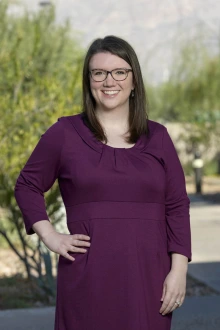Dr. Leslie Farland Receives 2021 ‘40 Under 40’ Award
Leslie Farland, ScD, MSc, assistant professor in the Epidemiology and Biostatistics Department at the University of Arizona Mel and Enid Zuckerman College of Public Health, was recognized at the end of 2021 with a “40 Under 40” Award.

Leslie Farland, ScD, MSc, was among four UArizona Health Sciences faculty to be honored with 40 Under 40 Awards in late 2021.
Dr. Farland was one of 40 Tucsonans under the age of 40 – including four from UArizona Health Sciences – recognized for their demonstrated leadership and community impact. The awards are presented annually by Snell & Wilmer with the Tucson Hispanic Chamber of Commerce and the Arizona Daily Star.
“It feels really nice to be recognized like this,” she said. “And I think it's especially nice because I know I was nominated by some of my colleagues in my department.”
Dr. Farland’s research focuses on women’s gynecologic health, including disparities in reproductive health care. Her recent studies include higher stroke risks among women with endometriosis, postmenopausal risk of cancer in women with fertility issues, and preterm birth, miscarriage and cancer risks among female firefighters due to chemical exposures in their work.
She also is one of several UArizona Health Sciences co-investigators on the CoVHORT Study to look at COVID-19’s health consequences, the impact of “long-haul” or long-lasting symptoms of the disease and related questions that arose with rollout of the vaccine.
“For a lot of people who were hesitant to get the vaccine, one of the reasons was because of how it may affect reproductive health in the long term. We know for a fact, though, that it does not appear to influence adverse pregnancy outcomes or fertility in the long term.”Leslie Farland, ScD, MSc
“We all brought our own expertise and background to that study, which has over 7,000 Arizonans enrolled,” Dr. Farland said. “Early in the pandemic, there was a lot of emphasis on COVID-19 and pregnancy. But there hasn’t been a lot of research to understand COVID-19 and gynecologic health.”
In particular, she has studied the effects of COVID-19 on women’s menstrual cycle.
“We observed that around 20% of our participants who were infected with COVID-19 reported changes in their menstrual cycle 30 days after infection,” Dr. Farland said. “That’s something we’re continuing to follow up on as we follow these participants over time.”
Additional research tracks possible changes in menstrual cycles due to the vaccine, for which a number of women reported an increase in cycle length.
“For a lot of people who were hesitant to get the vaccine, one of the reasons was because of how it may affect reproductive health in the long term,” Dr. Farland said. “We know for a fact, though, that it does not appear to influence adverse pregnancy outcomes or fertility in the long term.”
She also noted only about 30% of pregnant women get vaccinated, but they are 18 times more likely to be admitted to the ICU if infected by COVID-19.
Dr. Farland said widespread misinformation on the internet and social media about COVID-19 and the vaccine has proven a challenge for public health researchers like her.
“There’s a lot of misinformation out there. But we haven’t done a good job of being really clear about what we do know, which is that all the data so far have shown that the vaccines are safe for pregnant women and they’re safe for women trying to conceive,” she said.
Dr. Farland felt strongly enough about the issue that she recorded a video to dispel some of that, and she volunteered for more than 100 hours at the UArizona COVID-19 vaccination site last year.
A native of Iowa, Dr. Farland earned her bachelor’s degree from the University of Chicago, and her master’s and doctoral degrees from the T.H. Chan School of Public Health at Harvard University. She serves on a professional advisory board for the Cancer Support Community Arizona, is a member of Women in Fire’s reproductive health working group and is a junior ambassador for the World Endometriosis Society. In addition, she is on the editorial board of the journal, Paediatric and Perinatal Epidemiology.

